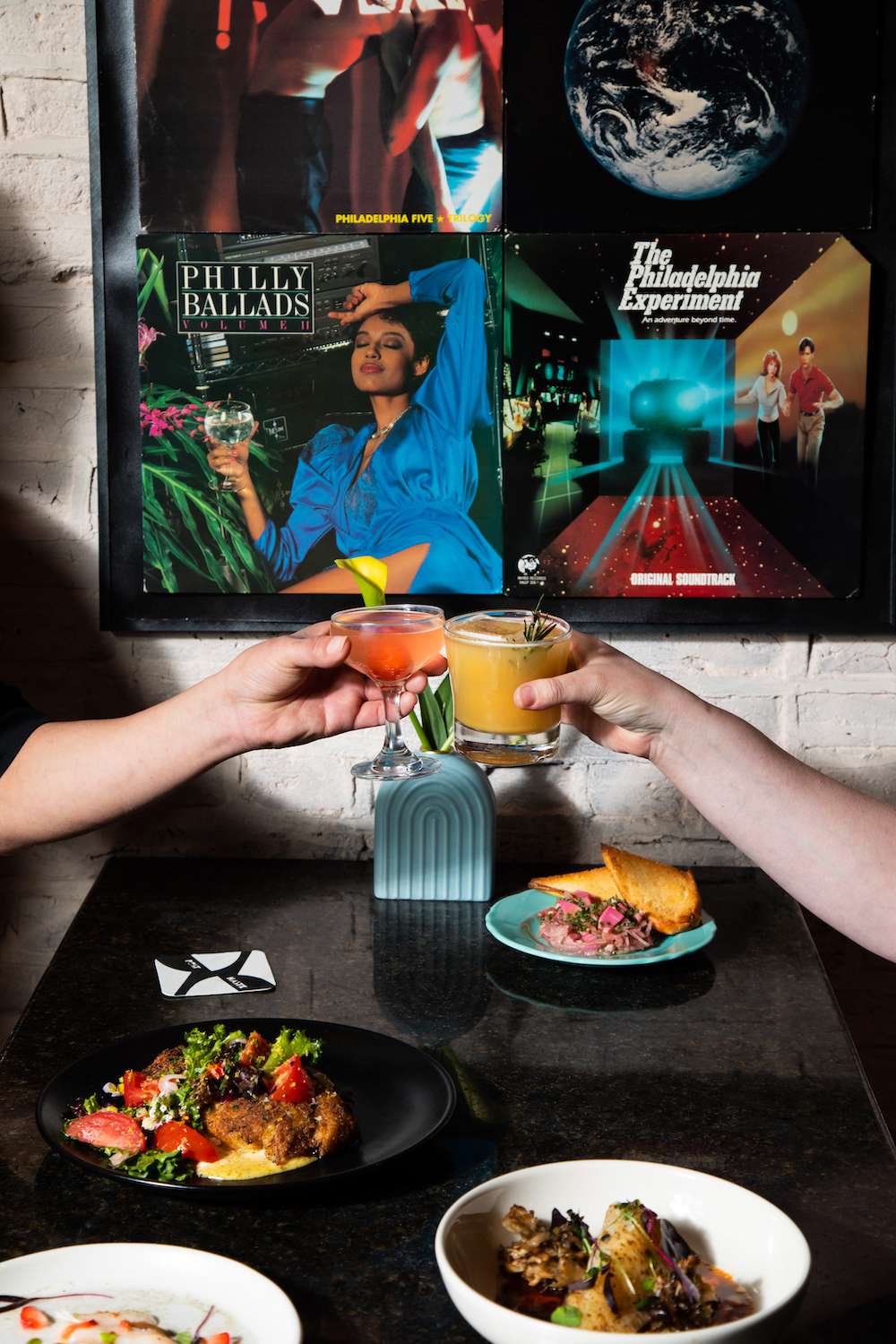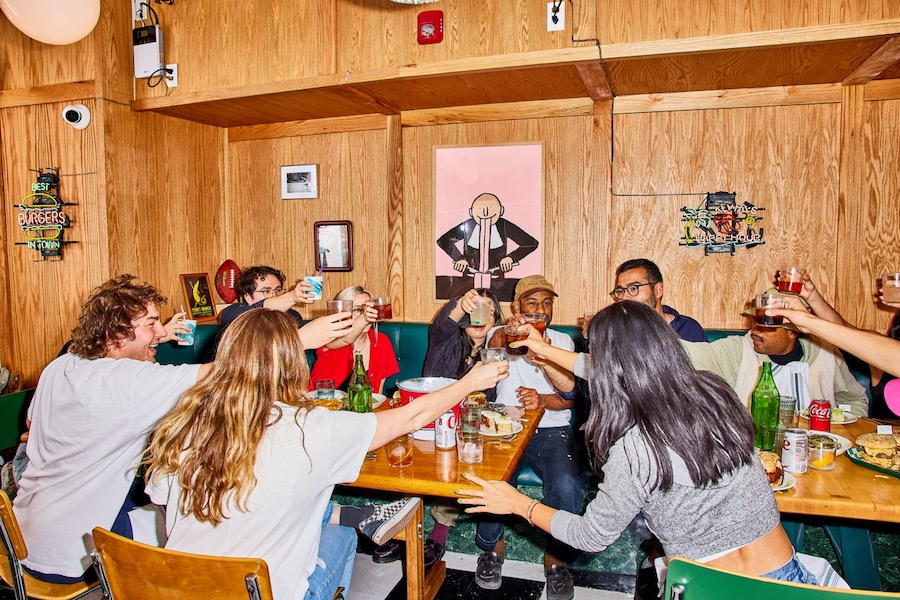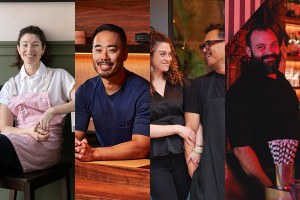The Imperfect Optimism of Philly’s Sustainable Bars
“We’re not going to cancel out global warming, but maybe we can encourage our employees to be a little better at the next place they work.”

The Pearnicillin cocktail at Post Haste, a new 70-seat bar on Frankford Avenue in Kensington that aims to source all of their ingredients from east of the Mississippi River to cut down on the fuel needed to transport liquor, citrus, and more. / Photograph by Gab Bonghi
You’ve surely heard the phrase “farm to table.” In the early aughts, servers at (mostly) New American restaurants waxed poetic about the provenance of a Lancaster half-chicken and its accompanying baby greens. Now, in 2023, menus list farms and local cheese makers like they’re as familiar as the concept of roast chicken itself. In contrast to restaurants’ commitment to telling you where your food hails from, the same principles are rarely applied to bar programs. It’s commonplace — and sometimes celebrated — for bars to source whisky made in Japan, mezcal from Oaxaca, and gin produced in the United Kingdom, shaken with juice from citrus shipped in weekly from Florida or maybe Mexico.
Post Haste, a new bar in Kensington from Gabe Guerrero and Fred Beebe, is one of a handful of Philly-area drinking establishments attempting to challenge the status quo around sourcing. In an effort to present more environmentally responsible drinking options to their customers, they have designed their beverage program to reduce the miles ingredients must travel. This means no Scotch, no lemons, no limes, no Sysco trucks.
Instead, Post Haste’s drinks menu includes a variation on a Penicillin cocktail that swaps Scotch for whiskeys made in Pennsylvania and the Finger Lakes, plus rosemary smoke, ginger-honey syrup, smoked pear juice, and yuzu superjuice. Superjuice — a technique in which citric and malic acid are combined with citrus peel, macerated, then blended with water and the juice of those fruits, and finally strained — produces eight times more juice than classic squeezing. It’s a key element in Post Haste’s program, Guerrero and Beebe say, allowing them to eschew industrially farmed fruit in favor of buying yuzu, kumquats and limequats from a small farm in New Jersey.
Guerrero and Beebe met in college, where they were both interested in international politics and agriculture. While in school, the college’s snack bar closed and the two students convinced the administration to let them take over the operation. They worked to source as close to 100 percent of the ingredients as they could from local and organic producers. “We would have these long debates about whether it was better to get tomatoes that were grown in a greenhouse but weren’t organic, or if we should get tomatoes from northern Mexico that were grown organically but were grown in a monoculture,” Beebe remembers. Conversations like these remain a constant at Post Haste.
The broad rule Guerrero and Beebe have given themselves is that they’re sourcing everything in their bar program east of the Mississippi River — an admittedly large geographic area. But the logistics of building a cocktail menu are far more complicated than adhering to a line on a map. Take the example of agave spirits. After much discussion, Beebe and Guerrero decided to use Hidden Still Agave Spirit, which is produced in Jalisco, Mexico, but diluted and bottled in Hershey, Pennsylvania.
“Sure, we could just not have agave on the bar, but people expect it, and we don’t want to scare people, so we felt like we needed to have it,” Beebe explains. Hidden Still Agave Spirit is imported from Mexico in large plastic totes, then distilled and proofed in Pennsylvania, a process that requires less energy than transporting heavy glass bottles of diluted spirits.

From left to right: Post Haste chef Elise Black, co-owners Fred Beebe and Gabe Guerrero / Photograph by Gab Bonghi
This tension between trying to reduce a business’s environmental impact and running a bar where people want to hang out remains top of mind for Danny Childs, too. As the beverage director at the Farm & Fisherman Tavern in Cherry Hill, Childs intentionally builds his cocktail program to highlight ingredients foraged and sourced from local farms. In some cases, he forages the ingredients himself, tending a large garden behind the restaurant.
Childs took over the restaurant’s bar program in 2016, at which point it was already established as a neighborhood spot. He knew he couldn’t clear out the bar and start from scratch; instead, he took the approach of developing guests’ trust over the years. Today, you can go into the Farm & Fisherman and order a Tito’s and soda, yes, but you can also order a ramp Gibson with Stateside vodka, fino sherry, ramp brine, and a chive-blossom garnish, a gesture at the pickled onion garnish for a classic Gibson. The drink exemplifies Childs’s cocktail style: It celebrates preserved, locally sourced ingredients and leans on PA spirits, without trying to substitute essentials like the fino sherry, which is made in the province of Cádiz between Jerez de la Frontera, Sanlúcar de Barrameda, and El Puerto de Santa María in southern Spain.
In interviews, Childs doesn’t readily mention sustainability. Instead, he focuses on how delicious foraged ingredients like spruce tips and fig leaves can be. This, as it turns out, is by design. He’s found that discussing drinking experience and flavors is a more effective way to engage guests than giving a lecture on sustainability from behind the bar.
“When we first put the ramp Gibson on the menu five years ago, no one ordered it,” Childs says. “Now, it’s one of our top sellers, because people trust us and they know we make delicious drinks first and foremost.”

Cocktails and snacks at Post Haste / Photograph by Gab Bonghi
Where Childs’s sustainability efforts spotlight local flavors, longtime Philly beverage pro Justin Holden will take a different approach at Doom, his heavy metal and spirits bar that will open sometime in 2024 next door to Franklin Music Hall. Holden has worked in bars and restaurants all over Philly. He is currently the beverage director at Royal Sushi & Izakaya in Queen Village.
“There’s a culture of waste in bars and restaurants that has always bothered me,” Holden says. “At home I’m peeling all the labels off of my recycling and being careful, and then at work I’m a part of these big places that generate a dumpster full of trash every couple of days.”
Holden plans to bypass the city’s mismanaged recycling program in favor of an alternative service that will, ideally, result in actual recycling. He’ll maximize the use of baskets and other dishes that can be sanitized by dunking, rather than constantly running a high-temperature dishwasher. He plans to ferment and preserve ingredients across the kitchen and bar, reducing waste and shrinking the need to ship out-of-season produce long distances.
“I just want to be thoughtful and pragmatic,” Holden says. “Doom itself is obviously not going to cancel out global warming, but maybe we can encourage our employees to try to be a little better at the next place they work.”
At Doom, Holden will also source liquor from small producers, a tactic shared by Middle Child Clubhouse beverage director Brandon Thrash.
“Small production gives us more buying power,” says Thrash. “If we’re talking about Middle Child making an impact on the world, then our impact is bigger for smaller companies.” To this end, Clubhouse carries Pennsylvania-made products like Boardroom Spirits’ vodka and Maggie’s Farm rum, but the team also tries to push customers toward booze that supports biodiversity.
“Whiskey, pretty much no matter where you get it, contributes to corn being monocropped, which has really harsh environmental impacts,” explains Thrash. “So I’m always trying to get people to drink more rum and brandy, because sugar and fruit are not as monocultural in terms of how they’re farmed.”

The Thousand Island Room at Middle Child Clubhouse / Photograph by Michael Persico
When operating a business tied to consumption, making sustainable choices is complex. Take the name of Holden’s bar: Doom comes from doom metal, but it also speaks to the kind of nihilism in trying to run an environmentally ethical bar. It would be easy, and possibly accurate, for Holden to throw up his hands and say the pursuit is not worth it.
“When global corporations are heavily polluting, it’s sort of like screaming into the void on an individual level,” Holden says. “But also, I land on this pragmatic approach where we want to do everything we can, and we want to be thoughtful about it.”
Anyone who frequents neighborhood bars knows that the drinks are only half the point of the experience. Bars are an essential gathering place where we go to forget the fog of wildfire smoke infiltrating our lungs and to remember that we’re connected to one another. There’s something fundamentally hopeful about places like Post Haste, Doom and Middle Child trying to create cocktails that take into consideration environmental impact. If we, as a human race, were really trying to be sustainable, maybe we wouldn’t be drinking at all. But here we are, in search of delicious cocktails and connection. By not throwing their hands up in the air and giving up in the face of complex sourcing logistics, these Philly bars can help us all be a little more connected.


